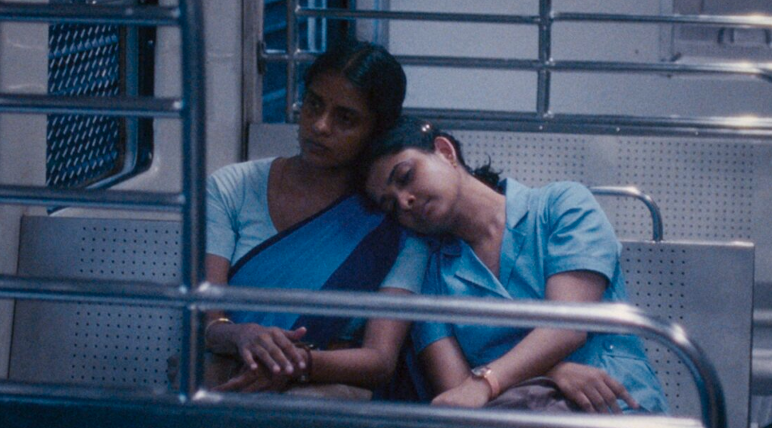
Payal Kapadia’s All We Imagine As Light opens with snippets of documentary-esque interview audio as the city of Mumbai wraps itself in a distinct, seemingly endless night. Migrant voices express longing, distress, and hope as a montage of the congested city roads reminds us of how the traffic is not dissimilar to them. Slowly, we are directed towards our protagonists: two Malayali nurses–Prabha (Kani Kusruti) and Anu (Divya Prabha)--riding the local train back home, their monotonous jobs, and their friend and hospital cook Parvaty (Chhaya Kadam). Prabha, is the older one: worn down by both years of loneliness and the quintessential big-city struggle alike. Her arranged marriage to a man settled in Germany is void of any real existence. Meanwhile at the hospital, whiffs of possible romance fly between her and one of the doctors, Manoj. Anu is younger, lively, and more self-assured. She spends her evenings with her Muslim boyfriend, Shiaz, making her the subject of workspace gossip and later on a sharp remark from a protective Prabha. Put side by side, the two women seem to be reflections of a youth long gone and the heavy future of the same person. The two come back home to an unnamed parcel containing a rice cooker which Anu suggests might be from Prabha’s husband. Later in the night, the crushing weight of loneliness stretches time and space for Prabha as she hugs the rice cooker on the floor. But, it is perhaps the scene where Prabha is reading Dr. Manoj’s poem that captures the first half of the film best. She reads his poem in the darkness of her tiny home with the city’s towering skyscrapers dominating her for most of the frame. All semblance of hope is swallowed by longing, restraint, and the circumstance that is the sprawling city of Mumbai itself. Kapadia’s Mumbai is almost consistently nocturnal; allowing the small flickers of light that grace its skyline to appear scarce, distant, and ever-present. Its inhabitants, however, are less concrete. They are fleeting, their impermanence reaffirmed by the huge corporations that surround them. It is Parvaty’s character that is the most clear victim of this. With no written record of her home, she is bullied into vacating it by a construction company. But, she is possibly the boldest of them all. She is headstrong in her fight against something that–as the film reminds us–is much larger than herself. In the end, however, she decides to leave the city. After all, Kapadia does not attempt to fool us with the proposition that the light exists beyond our twisted longing for hope. The second half of the film is about Parvaty returning to her village, accompanied by the two nurses. The women become a makeshift family on a pilgrimage; their presence in each other’s lives softening the strong blow of their harsh reality. There is visual respite in the scenic coastal village. It is a place where the women drink, dance, and are tempted with solace. Prabha finds catharsis in a hallucination-induced conversation with a man rescued from the sea. Anu consummates her relationship and finally opens up about. Parvaty finds peace in a home she can call hers. There is a certain stillness in All We Imagine As Light, one that feels laboured and relaxed at the same time. The transparency of this restrained emotional storm is what seeps through the performances of the actors; as if their skin were so wafer-thin that you could touch what their characters feel. Yet, by the end of the film, there is a certain lightness. The frame closes on an extra wide shot of the women dancing under a shack lit by festival lights. In that moment the lines of what is hope and reality blur together. This is by no means the death of the sick world they face. But, under the twinkling lights, we give way to hope yet again. Perhaps, this is what Kapadia wants us to take from the film itself. It is never really in the very existence of light itself, but in the perception of it, that we find comfort. A Still From All We Imagine As Light (2024)
05 Dec 2024
Riti Krishnan